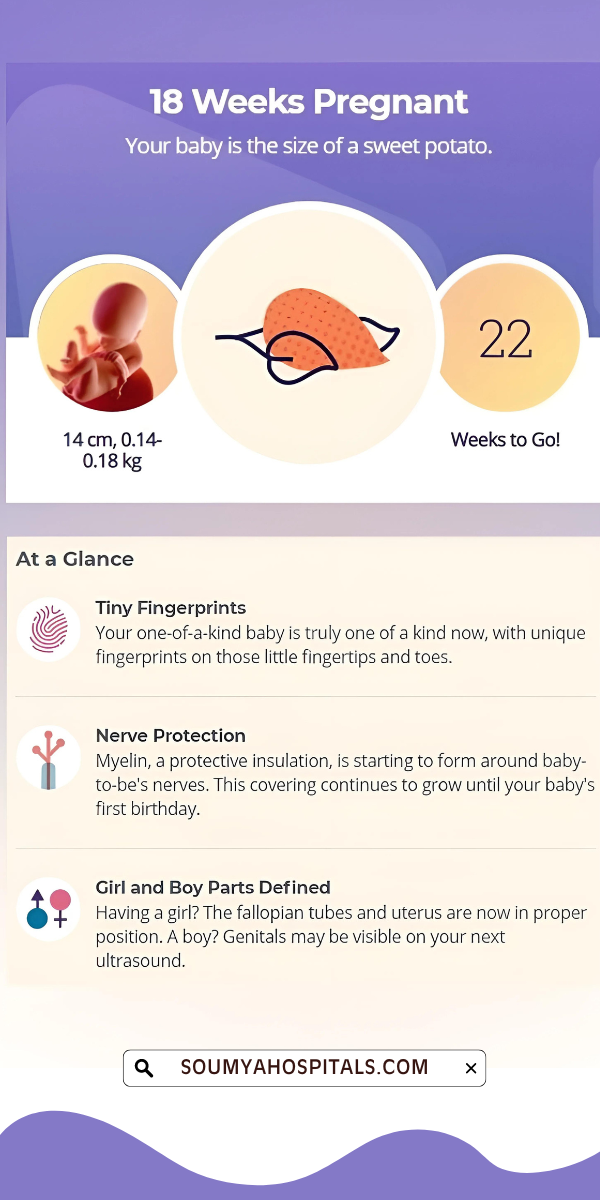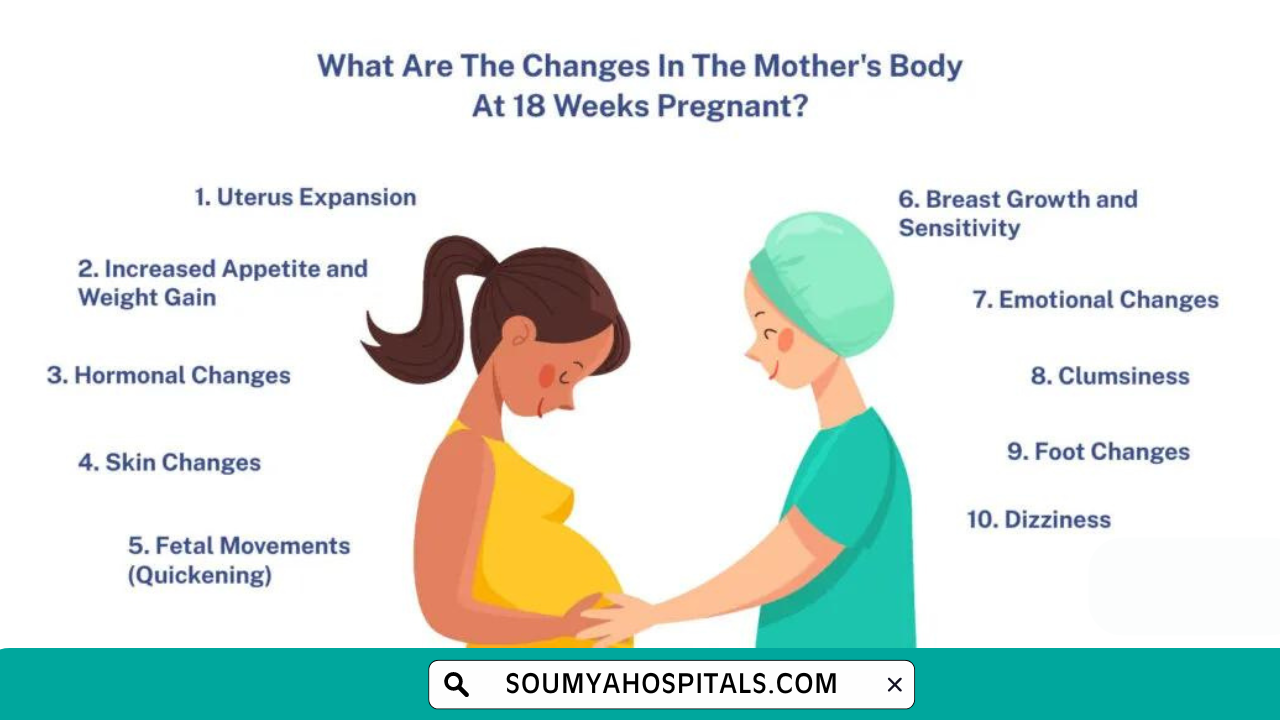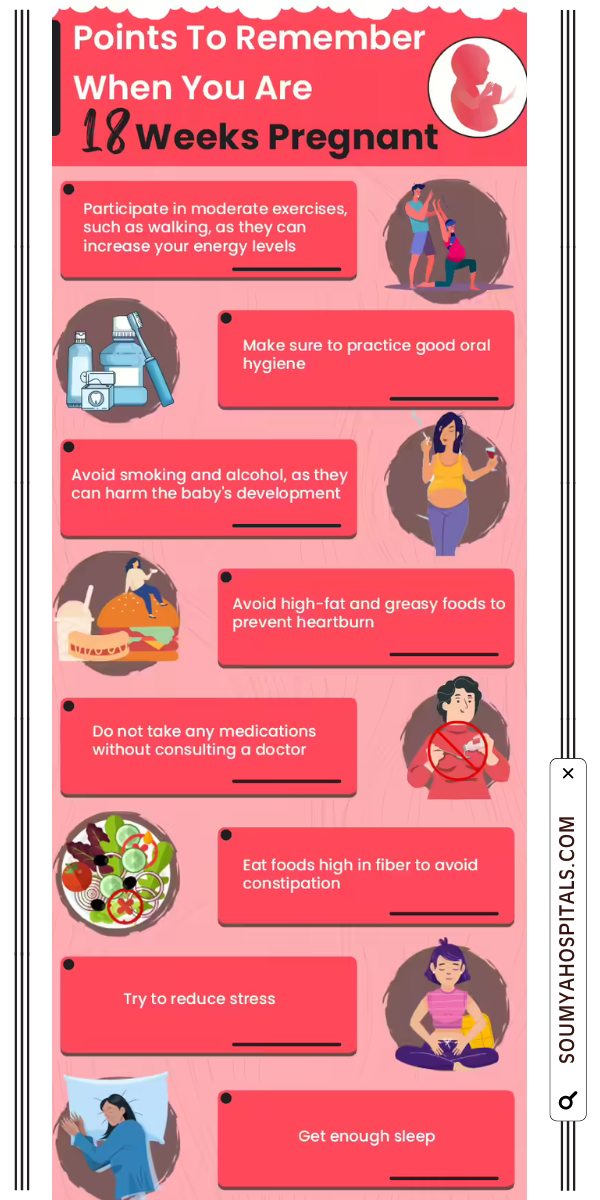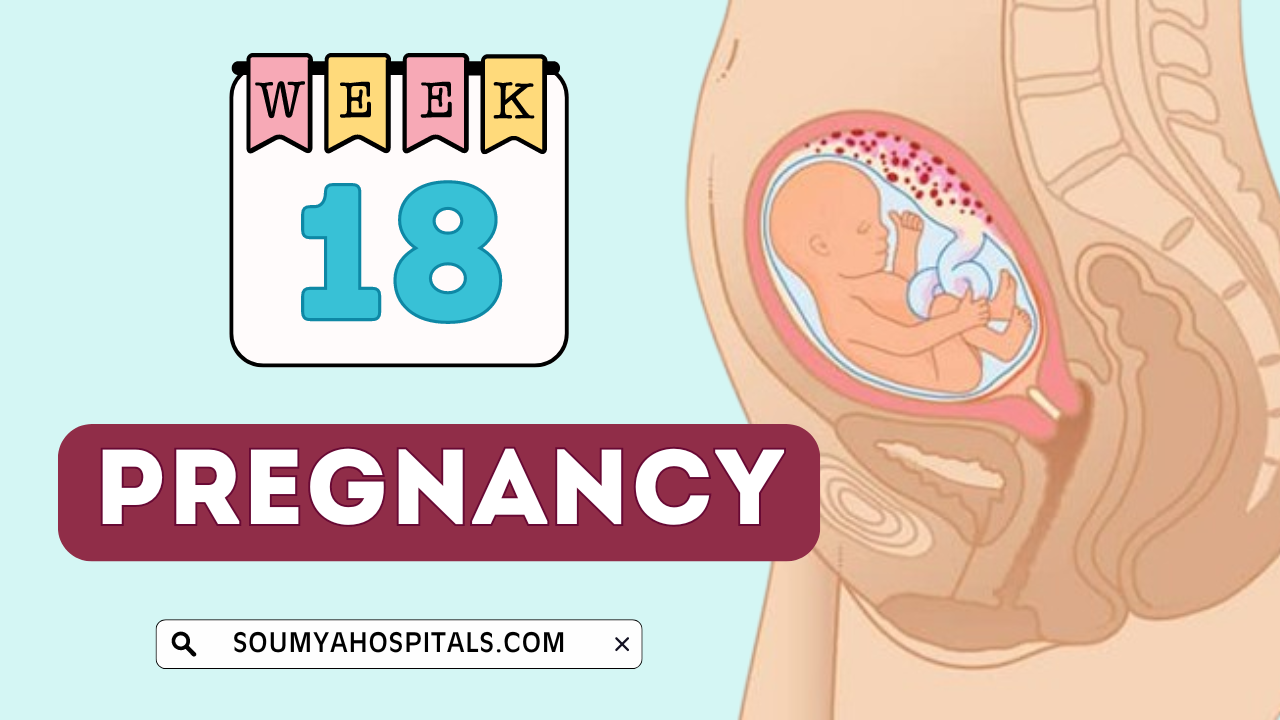Pregnancy at Week 18: You have almost travelled half of your pregnancy. 18 weeks is going to bring some worthwhile changes in your body. You may start to feel your fetus's movements. And your baby bump is growing. Let's look at how your baby develops along with 18 Weeks Pregnant symptoms you might experience.
Check On: Pregnancy Week By Week
- Highlights at Week 18 Pregnancy
- Your Baby’s Development at 18 Weeks Pregnant
- Symptoms for 18 Weeks of Pregnant Mother
- Dizziness
- Your Pregnant Belly During 18 Weeks
- 18 Weeks Pregnancy Ultrasound
- Tips for Week 18 Pregnancy
- How do I know my baby is ok at 18 weeks?
- Should I feel anything at 18 weeks pregnant?
- What pains are normal at 18 weeks pregnant?
- What foods make a baby move in the womb?
Highlights at Week 18 Pregnancy
Here we are providing some of the key features of pregnancy at 18 weeks.
Most women feel their baby's movements for the first time between week 18 and week 22. At first, the movements will feel faint like flutters. They will grow stronger and more frequent over time.
Learn About: 17 Weeks of Pregnancy
You have to go for your anomaly scan also called TIFFA or ultrasound II between weeks 18 and 20. This is your mid-pregnancy scan to check on your baby's organs and development.
In rare cases, the mid-pregnancy ultrasound reveals a problem associated with the placenta. Your OB will tell you if he suspects either placenta accreta or placenta previa and will be able to advise you on what care you will be given to lower any risks associated with either condition.
You will need a few extra calories to support your growing fetus, but you don't need to eat for two. Once you reach the second trimester, this could be an extra 300 calories - half of a sandwich and a glass of milk. You should have an average of 2000 calories per day.
Follow a Diet Rich in Omega-3 Fatty Acids
Gaining the required nutrients is important for you and your body, and omega-3 fatty acids play a crucial role in having a healthy diet. Omega 3s help to develop your little one's nervous system and some research shows that they may also help boost your immune system and reduce symptoms of depression.
Some of the rich foods are rich in omega-3 fatty acids are salmon or other fatty fish. Other vegetable sources of this nutrient are broccoli, flaxseeds or walnuts.
You may notice that everyone, from your mother-in-law to strangers, feels compelled to offer advice about your pregnancy. Although unsolicited opinions can be annoying, try to take them in stride. You don't have to explain yourself to anyone.
Your Baby’s Development at 18 Weeks Pregnant

At 18 weeks, you are about 4 months pregnant. Now, your 18-week fetus is working their muscles and practicing all kinds of movements. Can you believe or not your baby is yawning, hiccupping, sucking and swallowing? You can feel your baby kicking too. Here are the complete details about your baby's development during week 18 of pregnancy.
The developing digestive system has been going through its paces for several weeks already. Your baby swallows amniotic fluid, which makes its way through the stomach and intestines. That fluid will combine with dead cells and secretions in the intestines to form meconium - a black and tarry substance that you will see at the very first diaper change.
Your little one is developing a unique characteristic which is fingerprints. Pads of fat accumulating on the fingertips and toes will turn into distinguishing swirling lines.
At 18 weeks, your baby's ears will begin to stand out from the sides of the head and may even begin to register sounds.
Around week 18, your little one's lungs continue to develop. In this week, the smallest tubes of lungs called bronchioles begin to develop at the tips of the branches.
Your baby will need bile to digest nutrients and the gallbladder may start to work.
If you are having a boy, then his genital parts will become noticeable. Your baby girl's uterus and fallopian tubes will form on the other hand.
Symptoms for 18 Weeks of Pregnant Mother
During 18 weeks pregnant, you are too busy preparing for the baby. You might have some complex symptoms and signs such as swollen feet or hands, leg cramps, backaches and nosebleeds. And the stress and discomfort can keep you up at night around week 18 of pregnancy.
At this stage of your pregnancy, your body is going through a lot of changes, such as increased blood volume and rapidly expanding blood vessels, which can cause your blood pressure to drop. This can leave you feeling lightheaded if you are not getting enough blood flow to your head and upper body.
If this is your first pregnancy, you may feel the baby's movement inside your womb sometime soon. This fluttering feeling is known as quickening. As your baby gets bigger, you may notice stronger movements and maybe even kicks in the weeks to come. Because every mother is different, you may feel this movement earlier or in some cases even later. So, even if you don't feel any movements at 18 weeks, there is no need to worry.
Your heart is working 40 to 50 percent harder than it did before you were pregnant. This effort, combined with the pressure of your growing uterus on blood vessels, can occasionally leave you feeling faint, particularly when you get up quickly.
Be sure to rest frequently. Lie down on your side when you feel faint or dizzy. Low blood sugar can also lead to dizziness. Resting, lying down in bed, or eating fruit will help boost blood sugar levels and settle down dizziness.

This nasal issue is a result of high levels of hormones and increased blood volume, which causes mucous membranes to swell up, leading to nosebleeds and congestion.
Being week 18 pregnant might make your feet grow bigger. A part of this is because of the swelling caused by water retention called oedema, which can occur from the second trimester onwards.
Hormones also play a crucial role in growing feet. The pregnancy hormone relaxin, which relaxes your pelvic joints so your baby can fit through the birth canal, loosens the ligaments in your feet, causing the foot bones to spread.
Pregnant women can relieve the swelling with a footbath of cool water and by keeping their feet raised, don't worry if you need a bigger size shoe.
Along with hormonal changes, your baby is also growing which can lead to aches and pains in your lower back area.
This is one of the pregnancy symptoms that strike at night. Try to stretch your calf muscles before bed and stay hydrated. A warm bath, hot shower or massage can help.
Your Pregnant Belly During 18 Weeks
Your 18-week pregnant bump is rapidly expanding, all the stretching and pressure it's causing are what's prompting those symptoms. Weight gain at this stage is recommended to be about 1 to 2 pounds per week for women with normal BMI. Let your healthcare provider know if you have any concerns with your weight gain so far. Drastic or sudden weight gain or weight loss could be signs of a problem.
If you are 18 weeks pregnant and not showing much, everything is probably okay. Your baby is growing rapidly. You still have a couple of weeks to reach the midpoint of your pregnancy. Your doctor may suggest an ultrasound in the next appointment.
18 Weeks Pregnancy Ultrasound
The major ultrasound of the pregnancy will be on your calendar sometime in the next few weeks. The anomaly scan is a detailed explanation of the baby's entire body and organs. It's a pretty cool peek inside. Your 18-week fetus will be measured to make sure their growth is on track.
Major organs will be checked for proper development. And amniotic fluid, placenta location and fetal heart rate will also be examined, to be sure the baby is thriving.
If you are carrying twins, there is a membrane that separates your two 18-week fetuses. As they wiggle around in there, they will push fluid around and the membrane will shift slightly, you will be able to notice that on the 18-week ultrasound.
If you want to know whether you are having a baby boy or girl, the technician will be able to tell you with 95 to 100 percent certainty at the mid-pregnancy ultrasound as long as the baby moves into a position where their organs are visible. Some babies don't exactly cooperate.
Tips for Week 18 Pregnancy
Here is what you can do this week to prioritize your health and wellness and that of your little one too.
In addition to drinking a lot of water, you can help prevent leg cramps by including the right nutrients in your diet. Make sure you are getting calcium, potassium, and magnesium, either in your prenatal vitamin or in fresh fruits and vegetables.
Your feet may be swollen thanks to all the extra fluid you are carrying in your body to support the baby at 18 weeks, and gravity isn't helping matters. You can find some relief by using a pillow to elevate your feet above heart level and another good reason to relax and get some rest when you can. If swelling is especially bad, or you are on your feet a lot, try compression socks.
If you are craving a good night's sleep, then try using a pregnancy pillow. It can help you maintain a comfortable sleeping position on your side to accommodate your pregnancy baby's belly, and it can even reduce back and hip pain.
Show your aching back some TLC with a couple of simple yoga-style stretches that ease pain. Start in a tabletop position on your hands and knees with a flat back, and then round your back upwards as you gently pull your stomach up in a cat pose. Hold it for a few seconds before resuming the tabletop. The child's pose is also great and it's super relaxing too.

FAQs on 18 Weeks Pregnancy
1. How do I know my baby is ok at 18 weeks?
Your doctor will recommend an anomaly scan around weeks 18 and 20 to examine the baby's organs and how well the baby is doing. The scan shows every detail about the fetus and its development.
2. Should I feel anything at 18 weeks pregnant?
You can feel the baby move around a quite bit, and may respond to noises from the outside world such as music. You may not feel these movements yet if you are in your first pregnancy. The baby's moves feel like a soft fluttering or rolling sensation.
3. What pains are normal at 18 weeks pregnant?
Backaches, leg pains and dizziness are common during the 18 weeks of pregnancy. As your uterus expands and pushes your stomach out, your center of balance will change.
4. What foods make a baby move in the womb?
A glass of cold milk, the natural sugars and the chilly temperature of the drink are usually enough to spur baby movements in the womb.
Final Words
Expecting that we have shared enough information about 18 weeks pregnant. You are advised to visit the doctor regularly and take the required tests to know the health updates of both you and the baby. Stay in touch with our site to get updates on pregnancy scans and tests.
